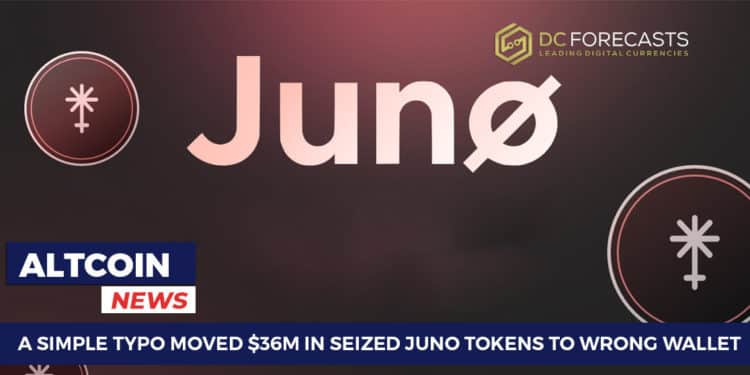A simple Typo moved $36 million in seized JUNO tokens to the wrong wallet and now developers and token holders grapple with who is to blame for the error which moved the tokens in the first place so let’s read more today in our latest crypto news today.
The Cosmos-based Juno blockchain continued to serve as a case study for the trials and travails of the on-chain governance. The community vote last week was supposed to seize millions of dollars worth of JUNO tokens from a wallet of a whale that was accused of gaming a community airdrop. Rather than sending the funds to the address controlled by the community, the programming error sent the funds to the wrong address.
The simple typo mistake moved the funds but the promise of the blockchain-based governance is that the will of the community is codified on-chain and in a world where “code is law” which is a community vote if it was enough to move the tokens from one blockchain to. The failure of a few human-controlled safeguards this week shows how the code-centric governance has yet to live up to the heady promise. Juno Proposal 20 which passed with overwhelming community support a week ago and revoked tokens from Takumi Asano as a Japanese investor accused of gaming the airdrop to the tune of $120 million in February. It was the first example to date of a blockchain community voting to alter the token balance of a single user accused of acting in a malicious manner.
According to the community vote, Asano ran an exchange service that should have rendered the wallets ineligible for the stake drop that gave JUNO tokens for stakers on the Cosmos Hub blockchain. After a delay of a few days, last week’s vote was supposed to run code automatically and move the funds which are now worth $36 million from the Asano wallet into a Unity address controlled by the Juno community. When the code got executed on Wednesday, the programming error ended up moving three million revoked JUNO tokens to a wrong address on the blockchain that nobody can access.
The member of Juno’s Core-1 founding developer team Andrea Di Michele said that the fudged transfer happened due to a copy-paste error:
“When I gave the [Proposal 20] developers the address of the [Unity] smart contract, I pasted the address of the smart contract and just underneath put the transaction hash. But I didn’t write ‘the transaction hash is this,’ I just put the transaction hash.”
DC Forecasts is a leader in many crypto news categories, striving for the highest journalistic standards and abiding by a strict set of editorial policies. If you are interested to offer your expertise or contribute to our news website, feel free to contact us at [email protected]
























Discussion about this post